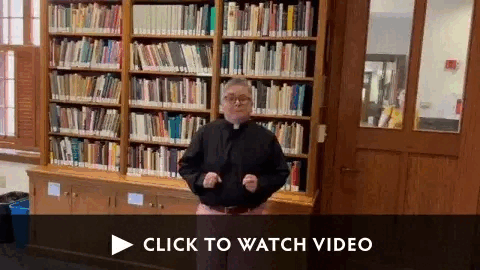Paul from Northern Michigan
Anglican History Summer: Vikings and Kingdoms (800-1000 AD)
The Most Important Meeting You’ve Never Heard Of: The Synod of Whitby, 664
I originally planned on sending a video this week, but I’m writing instead because I’m still recovering from Covid and it would take a lot to make myself look presentable! Remember that in my last video, we learned about the development of “Celtic” practices of Christian life in early Britain that were sometimes at odds with how things were done in Rome. Some of those differences were small, like the way monks cut their hair. Some were critically important for political and financial reasons. In the early British church, the real power brokers in the church were the abbots of monasteries rather than bishops. But one seemingly small difference in practice would rearrange how Christianity in Britain worked.
In the court of Northumbria, King Oswiu had been taught by Irish monks and followed their method for calculating the date of Easter. But Queen Eanflaed, his wife, was taught to calculate Easter according to the Roman method. When one half of a couple is celebrating Easter and the other is still fasting for Holy Week, it’s bound to create some tensions. In 664, a council was summoned to the great monastery of Whitby to settle the question once and for all: how do we know when it’s Easter?
Whitby functioned as a “double monastery”, where a community of monks and a community of nuns shared the same church but lived in separate quarters. Because they were generally governed by an abbess, these double monasteries were the home of powerful women leaders, and St. Hilda of Whitby was no exception.
The debate at the Synod of Whitby centered on a question that is still relevant for Christian life: Where does the church’s authority come from? Who decides, and on what basis, when differences of practice or belief come up? The supporters of the Irish method of calculation argued that “we’ve always done it this way,” a refrain you can hear in church arguments even today! But the supporters of the Roman method appealed to the authority given to Peter in Scripture: “You are Peter and upon this rock I shall build my church and the gates of hell shall not prevail against it and to you I give the keys to the kingdom of heaven.” King Oswiu found that logic convincing, and as a result Christian practice in Britain was brought into alignment with more universal practice.
I encourage you to check out the links and learn more about St Hilda, one of the truly fascinating women of Christian history.
This episode of Time Team, one of my favorite TV shows, focuses on the archaeological search for St. Hilda’s monastery.
Introducing Wesley!
A Trinity Church Special: Anglican History Summer
Come Celebrate Joanne
Dear friends,
I invite you to join us this Sunday, as we celebrate our beloved Joanne and give thanks for her faithful and transformative ministry at Trinity church. What a blessing Joanne has been to us and to so many beyond the walls of Trinity.
We will honor Joanne at each service this Sunday and then following the 10am service, we will gather in Pierce-Bishop Hall for a festive reception to give thanks for her ministry and to send her forth with our love and blessings.
In Christ,
The Rev. Paul Jeanes III, Rector
Unsentimentalized and Undomesticated
The dove descending breaks the air
With flame of incandescent terror
Of which the tongues declare
The one discharge from sin and error.
The only hope, or else despair
Lies in the choice of pyre of pyre-
To be redeemed from fire by fire.Who then devised the torment? Love.
Love is the unfamiliar Name
Behind the hands that wove
The intolerable shirt of flame
Which human power cannot remove.
We only live, only suspire
Consumed by either fire or fire.
— T. S. Eliot, Little Gidding
I think I’ve already talked to you recently about the church at Little Gidding, but on this weekend of Pentecost I have another story about it for you. It’s a story about the work of the Holy Spirit. In 2008, after a year and a half of not knowing what I wanted to do with the rest of my life, I took a trip to the UK and ended up at the church at Little Gidding — setting of the T.S. Eliot poem and home of the 17th century Anglican clergyman Nicholas Ferrar. (Ferrar, as you might recall, was the first to re-institute something like a post-Reformation monastic community in the Church of England.)
Anyway, I was eating breakfast in the kitchen of the tiny retreat house at Little Gidding when a gentleman walked in and sat at the table. He wasn’t a guest, but was apparently a priest who lived in the neighborhood. We began talking, and he asked me where I was from and why I was there. I told him a little about myself, and that I had just left my job with the government and was trying to figure out what might be next. Then, completely out of the blue, he said “you should get a PhD in theology and then you can do something very special for the Church.” Hearing this was alarming — and not a little terrifying. It was certainly unexpected.
Friends, I only vaguely considered going to seminary at all at that point. That encounter, with a man I had never met before and have never seen since, was one of the clearest examples of the Holy Spirit’s work in my life that I’ve ever experienced. It was the moment I received my vocation from God, though I only could clearly realize that in retrospect. But as Eliot describes the descent of the Holy Spirit in the excerpt above, there is something frightening about it. All too often we can sentimentalize and domesticate the Holy Spirit, turning the third person of the Trinity into a generalized source of good feelings. While it’s true that the Holy Spirit is named in Scripture as the Comforter, this is a comfort far different from what the world knows. The Holy Spirit opens up to us possibilities we never could have imagined, drawing us closer to God in ways that are not always easy or pleasant, but which are always sanctifying.
Where might God be speaking into your life, calling you to things you never thought possible? Where is God inviting you to draw near to the purifying fire of the Spirit that does not kill, but gives eternal and abundant life? This week, look around and listen. You might hear something unexpected, too.
Yours in Christ,
The Rev. Cn. Dr. Kara Slade, Associate Rector









